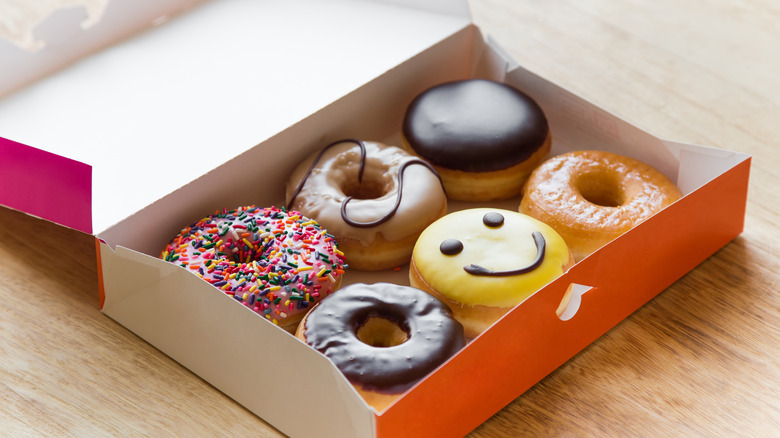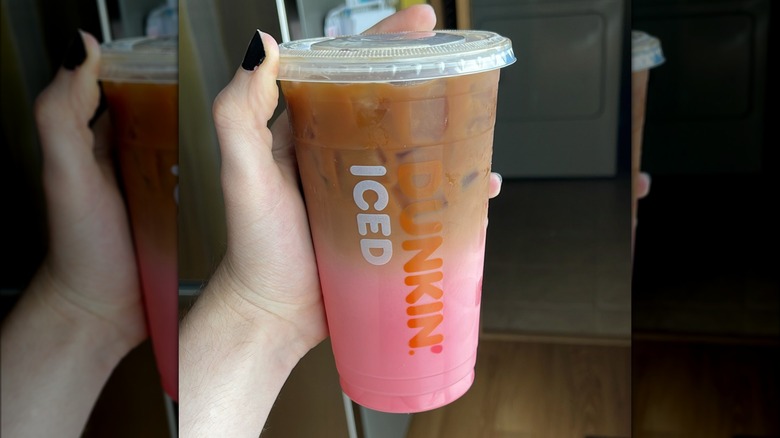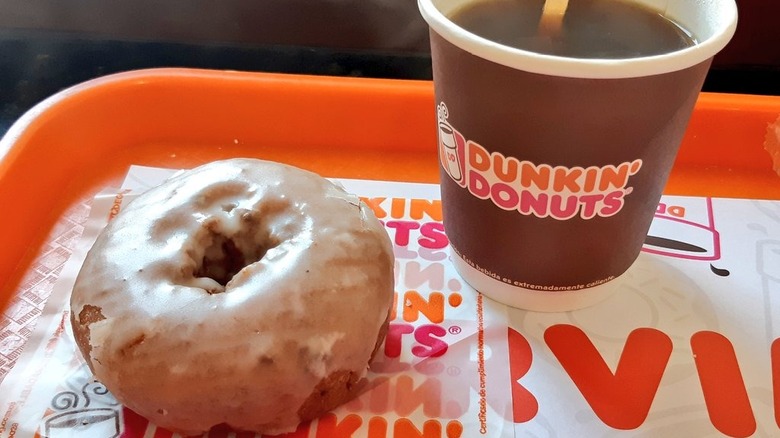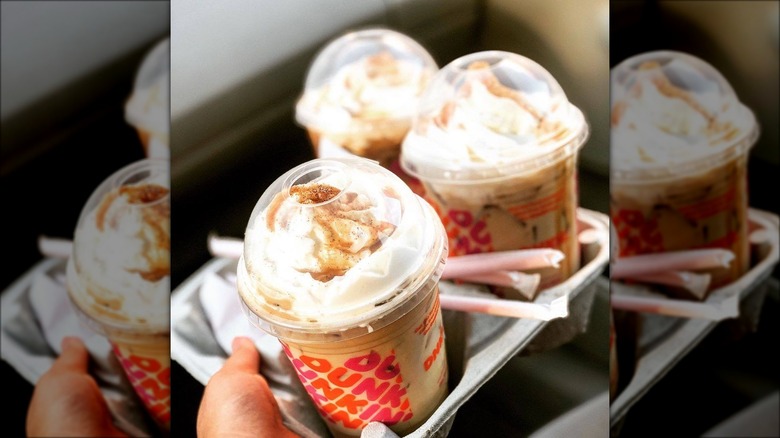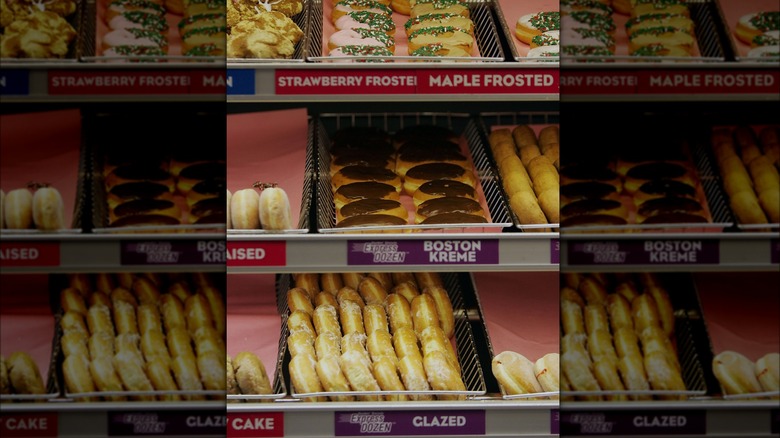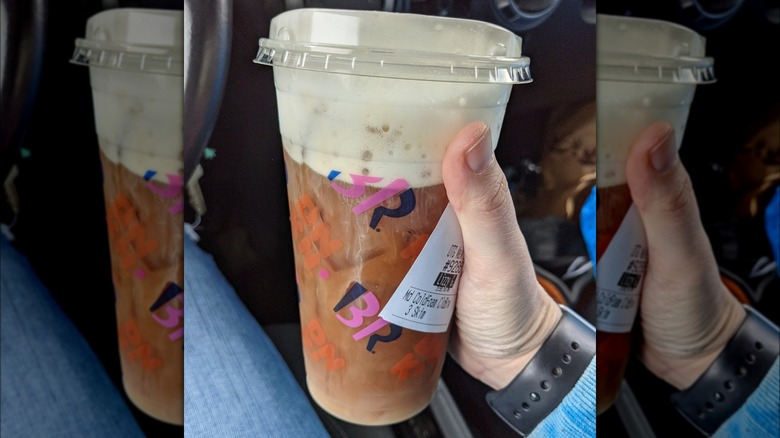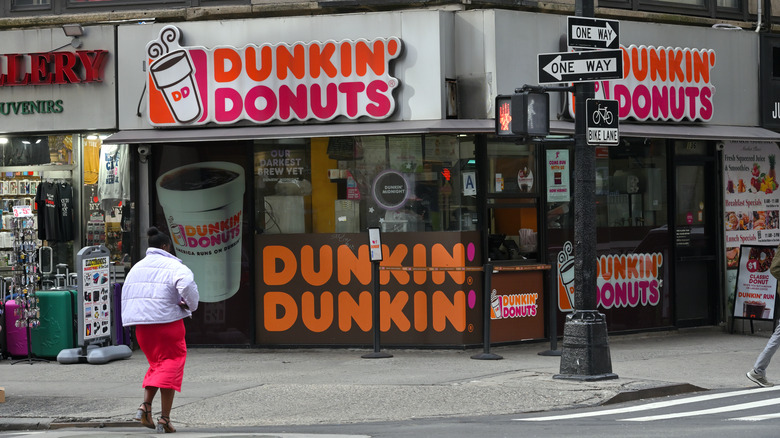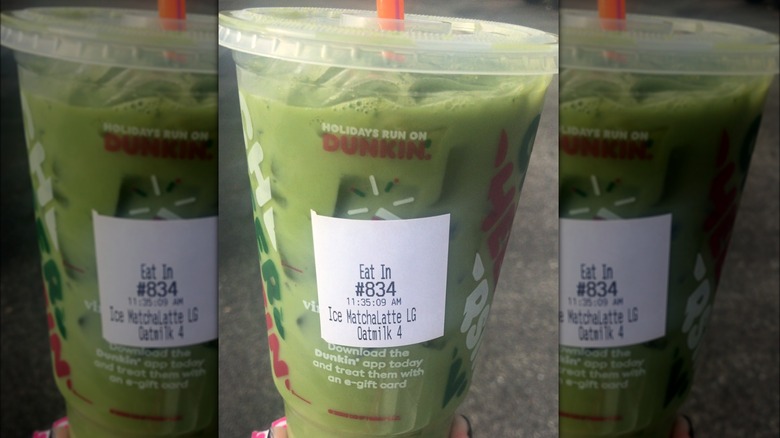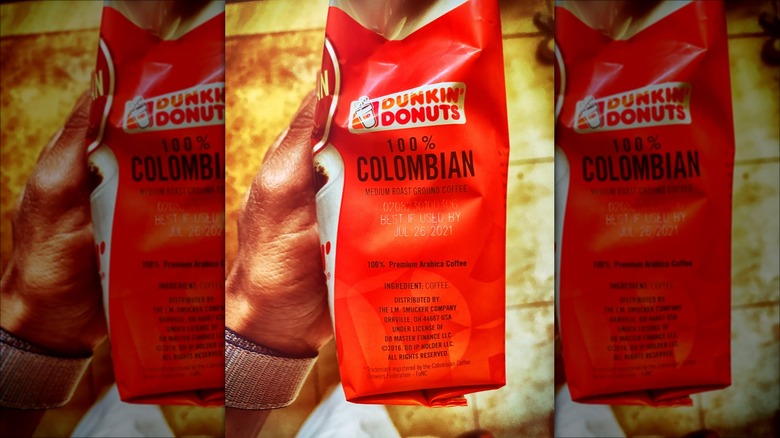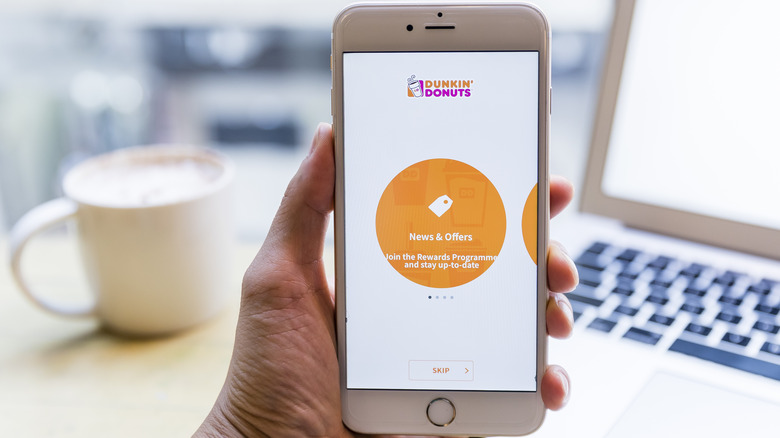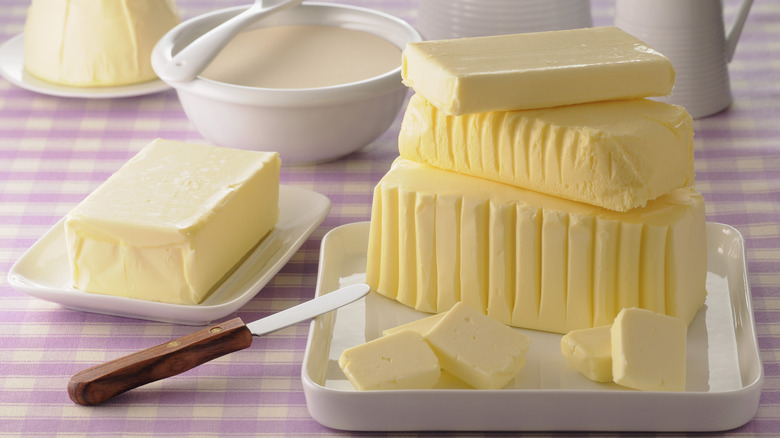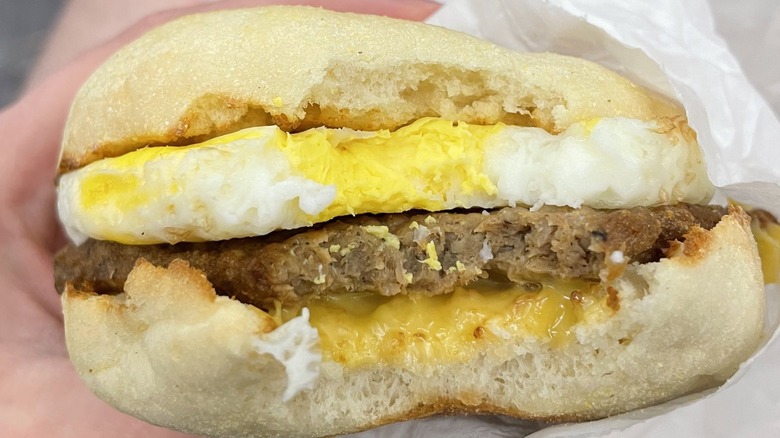Shady Things About Dunkin's Menu
The Dunkin' we know and love today is very different from the Dunkin' of years past. First founded in 1948 as Open Kettle, the chain has shuffled away from its donut-ridden origins, and in 2019 ditched the name "Dunkin' Donuts" to adopt its current moniker. Now focused on becoming your go-to sugary coffee chain (which just so happens to sell donuts, too), it boasts a whopping 13,200 locations worldwide, each boasting its own slightly different menu.
As with all fast-food chains, nobody expects these menus to be packed with healthy foods. While Dunkin' has certainly generated controversy around its sugar content in the past — especially its Pumpkin Swirl Frozen Coffee, which sent the internet spiraling in 2023 when it was revealed that it contains 167 grams of added sugar — there are much more shocking truths lurking in the chain's menu. From a lack of honesty over the ingredients in your go-to coffee to suspicious activity that may take place when you're placing your order, here are 11 shady things you should know about Dunkin'.
Some items are identical
The Pink Velvet Macchiato is a seasonal item that Dunkin' as a love letter to its customers. If online reviews are anything to go by, the love isn't especially appreciated. For many, the drink — which is supposedly a mix of red velvet and espresso — tastes less like cake, cream cheese, or a sign of Dunkin's appreciation and more like, well, nothing. Entire Reddit threads are dedicated to dissecting why this is the case, with a handful of employees offering a very simple explanation: it's the same as another menu staple, just dyed pink.
"It is French Vanilla dyed bright pink," claimed one Dunkin' worker on Reddit, sharing a picture of the syrup as proof when it returned to stores in January 2024 for the first time in almost three years. Another employee made the same claim on TikTok, showing jugs of the two syrups side-by-side. While several customers argue otherwise, insisting that they notice a difference between the two, a quick look at the ingredients for both syrups seems to suggest that they're telling the truth, with the only difference in the Pink Velvet being vegetable juice and annatto extract, which are both listed as colors.
It's been accused of lying about ingredients
Getting sued once for misleading customers over your ingredients is bad enough, but Dunkin' was accused of doing it multiple times in one year. The first incident occurred in June 2017 when Chufen Chen claimed it used false advertising to trick customers into thinking its Angus Steak and Egg Sandwiches contained steak when, in reality, they used a beef patty packed with fillers, binders, and additives, such as high fructose corn syrup, hydrolyzed vegetable protein, glycerine, and a long list of ingredients that sound more suited for a science lab than a food menu, like thiamin hydrochloride and disodium guanylate. "I believe this is consumer fraud," Chen's attorney, John Troy, told CNN at the time. "They try to promote the steak but actually it is not steak. It is a meat patty."
Just one month after Chen filed her lawsuit, Dunkin' was hit by a second case. This time around, Bartosz Grabowski argued on behalf of over 100 customers that its Glazed Blueberry Donuts contained not blueberries but "imitation blueberries" — which are flavored and shaped to look like the real thing — despite Dunkin' very clearly advertising actual blueberries next to the donuts in its marketing campaigns. Blueberries became a hot topic again when Dunkin' was sued by Hrach Babaian for misrepresenting the ingredients contained in its blueberry line of products, as well as doing the same in its maple range (which, surprise, surprise, contain no actual maple).
Pumpkin Spice contains no actual pumpkin
Nobody assumes they're getting one of their five a day from a pumpkin spice latte. However, at the very least, you do expect it to contain pumpkin. Sugary though they may be, the likes of Starbucks and Caribou both use purée from actual pumpkin to flavor their fall beverages. Dunkin' does not.
Instead, the chain's pumpkin spice range leans heavily into the "spice." A Dunkin' representative confirmed to The New York Times in 2019 that while its seasonal food items feature actual pumpkin, it instead uses "pumpkin spice flavoring similar to that used in pumpkin pie" for its beverages, such as cinnamon, nutmeg, cloves, and ginger. That means the flavor profile is very similar to the dessert itself, but there's not really anything distinctly pumpkin about the drink. It tastes good regardless — in fact, it placed third in our overall ranking of coffee chain pumpkin lattes — but the lack of naturally sweet pumpkin flavor does explain the astronomical levels of added sugar making headlines in recent years.
There's a reason the donuts taste better at some stores than others
If you've ever bought a Glazed Donut at one Dunkin' and raved about it, only to visit another location a week later to end up with a significantly less tasty baked good, you'll be pleased to know that your taste buds aren't fooling you. Dunkin' employees have previously revealed that each location has a different way of securing their donuts, which is why they can be inconsistent from store to store.
Franchise owner Amir Mohamed took to TikTok to explain the three options. "You can A, bake them yourself in your own kitchen inside the restaurant," he said. "You can have them delivered from a central kitchen, which you and other franchisees team up to build, called a CML. Or you could order JBOD, which are like disgusting frozen donuts." Mohamed clarified that baking them in-house typically garners the biggest, yummiest donuts, but that the second option — having them delivered from a nearby kitchen — is often the most popular as trying to produce that many donuts each day tends to transform the restaurant into an "absolute madhouse."
Mohamed went on to explain that you can normally taste which restaurants use JBOD donuts, which are reheated after arriving at each Dunkin' store frozen. "[Dunkin' says] the JBOD donuts taste the same, but I think you can tell which one is which because they're a little smaller and more dense," he explained.
Sweet Cold Foam isn't what you think
There are plenty of Dunkin' menu items you can replicate at home, but one of the easiest is any drink topped with Sweet Cold Foam since all it takes is about $3.50 and a quick trip to your nearest grocery store. In 2021, a TikTok user and disgruntled Dunkin' employee, who claimed they were on the verge of quitting, divulged several kitchen secrets in a video — including the exact item the chain purchases and markets as cold foam.
The secret? Reddi Wip. Yep, Dunkin's cold foam is actually canned whipped cream. To be specific, it's Reddi Wip's Sweet Foam variety from the brand's Barista line, which is made with non-fat cream and milk. Customers have had mixed responses to discovering this secret ingredient, with some claiming that it's fine as it tastes good, while others have argued that they're unsurprised it's whipped cream considering how quickly it sinks and becomes flat in your drink. One thing everyone can agree on is that it's become increasingly tough to get your hands on Reddi Wip Sweet Foam since its double life as Sweet Cold Foam was leaked.
Its rewards program has generated controversy
For years, Dunkin' customers and Dunkin's reward scheme lived in harmony — then the store gave it a total revamp. In 2022, DD Perks was axed and replaced with Dunkin' Rewards, which made it significantly harder (in other words, more expensive) to earn free drinks.
In the days of DD Perks, customers earned five points for every dollar spent. Once you'd racked up 200 points — which took $40 — you could redeem the points for a free drink. The scheme's replacement put every drink on different tiers. As of 2024, you'll get 10 points for every dollar, but you still need to spend $40 to earn a cup of tea, $50 for a coffee or cold brew, $70 for a non-coffee drink (such as a Dunkin' Refresher, Hot Chocolate, Chai Latte, or a Matcha Latte), and $90 for a frozen drink or hot or iced espresso drink. You can also snag a free "li'l treat" (either three Munchkins or six mini hash browns) with $15 worth of points, a donut with $25 worth, a wrap or bagel with $60 worth, or a breakfast sandwich with $80 worth.
The chain has made some tweaks since debuting Dunkin' Rewards, when customers felt so duped that they flooded Reddit with comments along the lines of, "This is a massive slap in the face." However, it's still a shadow of its former self, with regulars declaring "the reward system is garbage" to this day.
It charges more for dairy-free alternatives
Those who can't drink or don't like dairy can choose between oat and almond milk (and coconut milk until it was removed from the menu in 2023) when ordering a coffee at Dunkin'. There's just one condition: you'll have to pay between $0.50 to $2.15 more than your dairy-drinking counterparts. Considering the fact that a huge chunk of people aren't dairy-free by choice, this practice doesn't seem exactly fair — a consensus that drove multiple customers to actually sue Dunkin' in 2024.
A group of 10 Dunkin' regulars banded together to file the $5 million lawsuit, which claimed that charging those who request non-dairy milk extra is discriminatory to those who genuinely cannot drink dairy for health reasons. In comparison, Dunkin' doesn't charge extra for those ordering caffeine-free or sugar-free coffee. "It is medically necessary for persons like Plaintiffs to avoid consuming drinks that contain milk," the lawsuit argues. "Plaintiffs will suffer adverse health effects if they ingest milk or milk-containing products, including stomach pain, digestive tract inflammation, bloating, bowel irregularities, and vomiting."
Starbucks faced similar criticism in 2020 for essentially taxing those who want to order dairy-free coffee. Since then, it has axed charges for plant-based milk in several countries, including the U.K., France, and Germany. Customers in the U.S., however, still need to cough up more to ditch cow's milk. Which path Dunkin' will take remains to be seen, but these extra charges still lurk on its menu in the meantime.
Packaged beans are not the same as Dunkin's fresh coffee
Like a lot of coffee chains, Dunkin' offers its most diehard customers the opportunity to recreate its coffee at home. According to a former employee via the Coffee Detective who worked as a Dunkin' regional manager, however, the beans you purchase in-store or online will never produce coffee that tastes the same as that you'd order to take away.
The beans used in your local Dunkin' don't have to go through the same packaging process. Roasting, packing, shipping, and shelving coffee beans take up to a month, making them far less fresh than the beans each Dunkin' store receives within days of roasting. The packaged beans allegedly also tend to be a mix of Dunkin' beans and a lower-quality brand. There's a good reason behind selling slightly less delicious beans to customers who want to make their coffee at home: it keeps them coming back for more. "Every company that sells their brand coffee OTC does this," the former employee claimed. "Think about it as a Corp executive. If you had the exact coffee sold in stores would you go to buy it from the bistros? No you won't."
Its app may have some hidden charges
Dunkin's app exists to make it easier to order your favorite coffee on the go, but has faced flak for not being totally honest. Allegedly, at least. In 2023, the chain was subjected to yet another lawsuit when Martin Kelledy, a Dunkin' regular from Boston, claimed that it had been quietly adding undeclared charges and upping the total of his orders.
The lawsuit claimed that one example saw Kelledy order a large iced coffee for $3.69 and an Everything Bagel with Cream Cheese for $3.09. What should have come to $6.78 pre-tax was instead calculated at a total of $8.03 — which meant $1.25 of extra charges had been added on without his knowledge. While it's listed in Dunkin's terms of service that prices and menu items may vary depending on the location, the lawsuit argued (per Boston.com) that "the Dunkin' Mobile Application should not render, or allow franchisee operators or individual stores to render, charges that are not itemized, such as the $1.25 Undisclosed Charge." Next time you place your order, you may want to double-check for something similar; it may be cheaper to venture to your nearest Dunkin' than go digital.
Butter isn't always butter
Dunkin' faced yet another lawsuit in 2017 when a customer pointed out that several stores hadn't been entirely honest when he ordered butter. Jan Polanik filed (and won) two cases against the chain, accusing more than 20 Dunkin' locations throughout Massachusetts of using a butter substitute (later confirmed to be a vegetable spread) on his bagels. That was despite Polanik explicitly ordering real butter — dairy and all.
While it may not sound like a big deal in the grand scheme of things, Polanik's attorney Thomas Shapiro clarified at the time that it played into a bigger issue of restaurants not being totally honest about their menu items. "It's a minor thing," he told the Boston Globe, "but at the same time, if somebody goes in and makes a point to order butter for the bagel . . . they don't want margarine or some other kind of chemical substitute."
The company had previously explained that it gives customers butter when they ask for it on the side, but a substitute is used when an employee applies it as it's easier to spread. "For food safety reasons, we do not allow butter to be stored at room temperature, which is the temperature necessary for butter to be easily spread onto a bagel or pastry," a Dunkin' representative said. Since then, stores have allegedly changed their butter-serving protocol, so you should know exactly what you're eating next time you ask for extra butter on your bagel.
Its breakfast sandwiches contain egg patties, not egg
If you order a Dunkin' sandwich containing egg, don't worry — you are actually eating egg. However, this isn't egg in the traditional sense. Instead of being freshly cracked and fried in a pan, the egg in your order is actually an egg patty made to look like a single fried egg. This concoction is composed of 10 ingredients: egg whites, egg yolks, soybean oil, water, corn starch, salt, natural flavor, xanthan gum, cellulose gum, and citric acid.
That sounds like a lot, but it's actually a major step up from the egg patties of Dunkin's past. Back in 2020, before the chain committed to improving the quality of its menu (with the eggs singled out as a primary focus), the patties contained over a dozen ingredients. Rewind another four years and Dunkin's egg patties contained more water and less egg. The chain has consistently labeled this as a straight-up egg over the years, not an egg patty, which shocked some customers when they discovered the truth. A TikTok showcasing a box full of frozen Dunkin' patties went viral in 2019, with one user simply responding, "I'm concerned." A different user compared the patties to hockey pucks, while another warned that it can get much worse. "Y'all should look at the Subway eggs," they said. "They weird."
